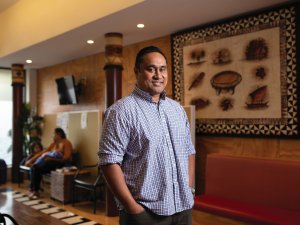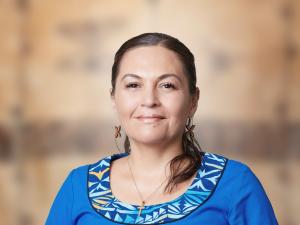Respiratory physician Lutz Beckert considers chronic obstructive pulmonary disease management, including the prevention of COPD, the importance of smoking cessation and pulmonary rehabilitation, and the lifesaving potential of addressing treatable traits. He also discusses the logic of inhaler therapy, moving from single therapy to dual and triple therapy when indicated, as well as other aspects of management
Minister orders new strategy, finds Pacific communities’ health on a par with Māori
Minister orders new strategy, finds Pacific communities’ health on a par with Māori

The Government appears open to doing more to lift the health of Pacific New Zealanders. The question is, writes Alan Perrott, how much say will Pacific peoples have in their own healthcare?
Pacific health must be resourced well, skilled and Pacific-led, to meet the significant challenge of poor health and persistent inequities, says health minister Andrew Little.
In the Cabinet paper that prefaced the announcement of the Government’s health system reforms, Mr Little said Pacific peoples’ health outcomes are commensurate with those of Māori, and must be addressed if inequities are to be reduced.
He has called on the Ministry of Health to develop a new strategy, which will fall within the “whole system strategy”, and get picked up by new agency Health New Zealand.
Health NZ will be expected to commission a Pacific people’s needs assessment and follow-up plan to address those needs, establish an expert group, develop partnerships with Pacific nations and develop capability to commission services for Pacific people.
Senior Pacific leadership is to provide advice and leadership, and support accountability across the entire health and disability system.
We hold the documents so you don’t have to! Our coverage of the Little reforms references a number of documents which we have gathered together on our website
Pacific healthcare providers have greeted the health reforms with cautious optimism. Most say they have lost count of the number of studies and reports on the alarming health needs within their communities.
Some have suggested that a demonstration of support for the Māori Health Authority could eventually lead to a similar entity for Pacific peoples. The idea hasn’t gained significant traction, however. There is a long-held understanding that improvements in Māori health will lead to improvements in the health of Pacific peoples.
But, beyond the reforms specific to Pacific health, great hope is also being placed in Mr Little’s call for a new, whānau-centred model of care to replace the competitive funding model that is blind to population risk.
South Seas Healthcare chief executive Silao Vaisola-Sefo has told New Zealand Doctor Rata Aotearoa the traditional business model is damaging, as it inhibits cooperation between thinly spread Pacific health practitioners.
Mr Vaisola-Sefo says major challenges, such as the COVID-19 response, have forced cooperation between practices so that resources, workforce and ideas can be shared.
There is also growing cooperation between Pacific and Māori practices that see innovation as necessary to meet massive levels of unmet community need, especially in a COVID-19 environment that has worsened economic disparities.
This has led to a Pacific consortium of five south Auckland practices agreeing to work together on broad community health programmes.
Still, Mr Vaisola-Sefo says workforce issues require urgent action, and he believes the immediate need is for more Pacific GPs and nurses.
He says the presence of Pacific medical staff at South Seas’ community-based assessment centre last year was a significant reason for its success and community uptake, but practitioners were at risk of burnout from the high workload.
At Hamilton-based K’aute Pasifika Trust, chief executive Leaupepe Rachel Karalus is leading construction of a Pan-Pacific health hub to serve the Waikato’s growing Pacific population and says the reforms should broaden opportunities for providers.
Planned years before the new health reforms, the health hub is being purpose built to provide whanau-centred healthcare, with an emphasis on addressing the wider social determinants of health such as housing and employment in the area.
Without a Pacific health authority, Ms Karalus says the reforms must include Pacific representation at all levels of the emerging system, especially at governance levels.
Accountability will be further boosted, she says, if Health NZ’s Pacific programme is directed by the Pacific Aotearoa Lalanga Fou report and is answerable to the Ministry for Pacific Peoples.
Pacific researcher and former GP Debbie Ryan has highlighted the low numbers of Pacific medical specialists and high-level administrators, and says this situation must be turned around if there is to be a broad-based, Pacific-led health response. But Dr Ryan warns it is not enough to have the need for such a response acknowledged at the highest levels; the response must be funded and “operationalised” effectively.







![Barbara Fountain, editor of New Zealand Doctor Rata Aotearoa, and Paul Hutchison, GP and senior medical clinician at Tāmaki Health [Image: Simon Maude]](/sites/default/files/styles/thumbnail_cropped_100/public/2025-03/Barbara%20Fountain%2C%20editor%20of%20New%20Zealand%20Doctor%20Rata%20Aotearoa%2C%20and%20Paul%20Hutchison%2C%20GP%20and%20senior%20medical%20clinician%20at%20T%C4%81maki%20Health%20CR%20Simon%20Maude.jpg?itok=-HbQ1EYA)
![Lori Peters, NP and advanced health improvement practitioner at Mahitahi Hauora, and Jasper Nacilla, NP at The Terrace Medical Centre in Wellington [Image: Simon Maude]](/sites/default/files/styles/thumbnail_cropped_100/public/2025-03/2.%20Lori%20Peters%2C%20NP%20and%20advanced%20HIP%20at%20Mahitahi%20Hauora%2C%20and%20Jasper%20Nacilla%2C%20NP%20at%20The%20Terrace%20Medical%20Centre%20in%20Wellington%20CR%20Simon%20Maude.jpg?itok=sUfbsSF1)
![Ministry of Social Development health and disability coordinator Liz Williams, regional health advisors Mary Mojel and Larah Takarangi, and health and disability coordinators Rebecca Staunton and Myint Than Htut [Image: Simon Maude]](/sites/default/files/styles/thumbnail_cropped_100/public/2025-03/3.%20Ministry%20of%20Social%20Development%27s%20Liz%20Williams%2C%20Mary%20Mojel%2C%20Larah%20Takarangi%2C%20Rebecca%20Staunton%20and%20Myint%20Than%20Htut%20CR%20Simon%20Maude.jpg?itok=9ceOujzC)
![Locum GP Helen Fisher, with Te Kuiti Medical Centre NP Bridget Woodney [Image: Simon Maude]](/sites/default/files/styles/thumbnail_cropped_100/public/2025-03/4.%20Locum%20GP%20Helen%20Fisher%2C%20with%20Te%20Kuiti%20Medical%20Centre%20NP%20Bridget%20Woodney%20CR%20Simon%20Maude.jpg?itok=TJeODetm)
![Ruby Faulkner, GPEP2, with David Small, GPEP3 from The Doctors Greenmeadows in Napier [Image: Simon Maude]](/sites/default/files/styles/thumbnail_cropped_100/public/2025-03/5.%20Ruby%20Faulkner%2C%20GPEP2%2C%20with%20David%20Small%2C%20GPEP3%20from%20The%20Doctors%20Greenmeadows%20in%20Napier%20CR%20Simon%20Maude.jpg?itok=B0u4wsIs)
![Rochelle Langton and Libby Thomas, marketing advisors at the Medical Protection Society [Image: Simon Maude]](/sites/default/files/styles/thumbnail_cropped_100/public/2025-03/6.%20Rochelle%20Langton%20and%20Libby%20Thomas%2C%20marketing%20advisors%20at%20the%20Medical%20Protection%20Society%20CR%20Simon%20Maude.jpg?itok=r52_Cf74)
![Specialist GP Lucy Gibberd, medical advisor at MPS, and Zara Bolam, urgent-care specialist at The Nest Health Centre in Inglewood [Image: Simon Maude]](/sites/default/files/styles/thumbnail_cropped_100/public/2025-03/7.%20Specialist%20GP%20Lucy%20Gibberd%2C%20medical%20advisor%20at%20MPS%2C%20and%20Zara%20Bolam%2C%20urgent-care%20specialist%20at%20The%20Nest%20Health%20Centre%20in%20Inglewood%20CR%20Simon%20Maude.jpg?itok=z8eVoBU3)
![Olivia Blackmore and Trudee Sharp, NPs at Gore Health Centre, and Gaylene Hastie, NP at Queenstown Medical Centre [Image: Simon Maude]](/sites/default/files/styles/thumbnail_cropped_100/public/2025-03/8.%20Olivia%20Blackmore%20and%20Trudee%20Sharp%2C%20NPs%20at%20Gore%20Health%20Centre%2C%20and%20Gaylene%20Hastie%2C%20NP%20at%20Queenstown%20Medical%20Centre%20CR%20Simon%20Maude.jpg?itok=Z6u9d0XH)
![Mary Toloa, specialist GP at Porirua and Union Community Health Service in Wellington, Mara Coler, clinical pharmacist at Tū Ora Compass Health, and Bhavna Mistry, specialist GP at Porirua and Union Community Health Service [Image: Simon Maude]](/sites/default/files/styles/thumbnail_cropped_100/public/2025-03/9.%20Mary%20Toloa%2C%20Porirua%20and%20Union%20Community%20Health%20Service%20in%20Wellington%2C%20Mara%20Coler%2C%20T%C5%AB%20Ora%20Compass%20Health%2C%20and%20Bhavna%20Mistry%2C%20PUCHS%20CR%20Simon%20Maude.jpg?itok=kpChr0cc)